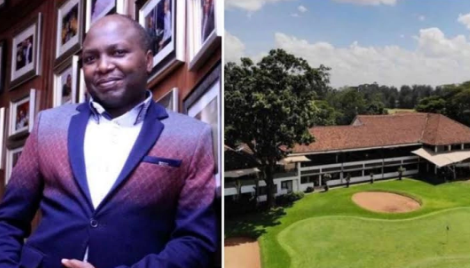A compelling debate has emerged online following a Nairobi Court’s ruling that Muthaiga Country Club must admit prominent and outspoken city lawyer Donald Kipkorir.
The ruling came after Kipkorir’s lawyers filed a complaint, alleging that the exclusive club had barred him from accessing the premises and meeting with his friends based on race and tribe. Kipkorir clarified that he had never applied to be a member of the club and had no intention of doing so in the foreseeable future.
He stated, “Justice Chacha Mwita of the High Court has just ordered Muthaiga Country Club not to block me if I am invited by a Member. I have never applied to be a Member of Muthaiga Country Club nor have intentions in the near future.”
Kipkorir also noted, “My lawyer @pwanyama has with robust erudition pleaded in my Constitutional Petition that my mistreatment by the Club may be both racial & tribal as the Club’s Board is mainly white.”
He further added, “At the right time, my lawyer will demand the Immigration Status of the Board! The law will be followed to the letter even if the Club will collapse on its Colonial History!”
In his ruling, Justice Chacha Mwita issued a conservatory order, restraining the Club’s “officials, agents, and security” from denying Kipkorir access. The order states, “A conservatory order is hereby issued restraining Muthaiga Country Club, its officials, agents, servants, and or anyone acting on its behalf, from denying the petitioner (Mr. Kipkorir) access to the club premises on invitation by members of the club.”
Kipkorir’s petition to the High Court claimed that he had been denied entry on two occasions, which hindered his work as an advocate and violated Article 10 of the Constitution. He argued that this impediment affected his professional duties since his clients are members of the club.
Kipkorir’s lawyer, Peter Wanyama, also addressed the issue on X, asserting that the private club was infringing on Kipkorir’s rights. He wrote, “We have obtained conservatory orders to stop Muthaiga Country Club from blatantly denying our client access to the club for no reason at all. Kenya is a constitutional democracy that has a Bill of Rights, which can be horizontally enforced against problematic private institutions that violate fundamental rights and freedoms of its citizens.”
Wanyama added, “Muthaiga Country Club has demonstrated this peculiar fecundity to deny our client access; it has put him in some kind of blacklist, yet it enjoys the fresh aura of freedoms that the Bill of Rights guarantees it.”
The issue has sparked a heated debate online, with opinions divided. Some argue that the club should grant Kipkorir access, while others believe that as a private institution, the club reserves the right to control admission.
The debate around the Muthaiga Country Club’s refusal to admit lawyer Donald Kipkorir has prompted varied reactions online. Critics have highlighted that, despite Kipkorir’s financial resources and social capital, the Club’s decision to exclude him suggests that his presence is not valued. This aligns with the saying, “Go where you are appreciated, not where you are tolerated.”
Gabriel Otieno questioned the need for Kipkorir to insist on entering a space where he is not wanted, noting, “But why go where you are not wanted? Clearly, these people don’t want you. This case has many loopholes. They can now decide to ban your member friends. Why should you force yourself onto private property?”
Another commentator argued, “I don’t think it’s a race issue or even tribe. Exclusive clubs act like that all around the world. In fact, there are clubs in Europe and the US where even Donald Trump is not allowed to access. It all boils down to character. Kipkorir should, instead, look inwards, not outwards.”
X user Waithera Mwangi added a personal dimension to her argument, stating, “Contradictions of negative elitism: This man is constantly fighting for the exclusion of hawkers and matatus in Karen and openly scorns them for undermining his prestige. But he doesn’t want others to exert their racial and cultural elitism…”
Amid the conversation, some clarified that Muthaiga Country Club is distinct from Muthaiga Golf Club. Although both are private members-only clubs in the same locality, they have different rules and membership charges.
Supporters of Kipkorir’s stance argued that denying access based on arbitrary reasons is not acceptable. James Mungai commented, “The matter is already at the courts. The Club should now provide a tangible excuse for denying the lawyer access. Unless they have reasonable proof of misconduct, they have no reason to deny him entry. Either that or they are as racist as he claims!”
In Kenya, private members-only country clubs, including Nairobi’s Karen Country Club, Muthaiga Country Club, Windsor Golf Hotel and Country Club, and Royal Nairobi Golf Club, are prevalent. Many of these clubs were established during the colonial era and have been in operation for over a century.
For example:
– The Royal Golf Course was established in 1906
– Vetlab Golf Club in Loresho was founded in 1923
– Muthaiga Country Club opened in 1927
– Kiambu Country Club started in 1916
– Mombasa Golf Club was founded in 1911
– Kitale Golf Club began in 1924
These clubs typically enforce strict etiquette rules, such as:
1. Members are not allowed to discipline or instruct employees at any time and cannot send Club employees away from the premises.
2. Members must present their membership cards when requested by Club employees in the course of their duties3. Members and guests must adhere to parking regulations; vehicles parked improperly or obstructing driving lanes will be removed at the owner’s expense.
4. Loud, boisterous, or profane language is prohibited on the golf courses and within any Club facilities. Members are responsible for ensuring that their family members and guests also adhere to this rule.
5. The House Committee is responsible for enforcing all Club rules, regulations, policies, and procedures. They also have the authority to take disciplinary action against members who violate these rules.
6. Complaints, criticisms, or suggestions regarding the Club’s operations or employees must be submitted in writing, signed, and addressed to the Club Manager.



